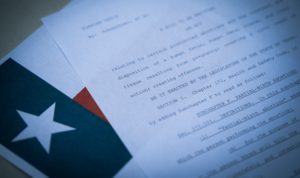
The Fifth Circuit rules that Texas hospitals are not required to follow HHS abortion guidance, the Ninth Circuit allows California to restrict public gun possession, and more…
IN THE NEWS
- The U.S. Court of Appeals for the Fifth Circuit ruled that hospitals in Texas are not required to follow Biden Administration guidance designed to provide emergency access to abortion. The guidance, issued by the U.S. Department of Health and Human Services, instructs hospitals to require doctors to perform abortions if they believe the procedure is “the stabilizing treatment necessary” in an emergency. The court explained that the guidance extends beyond what Congress permitted when it passed the Emergency Medical Treatment and Labor Act of 1986, which does not provide an unqualified right to abortion.
- The U.S. Court of Appeals for the Ninth Circuit reversed a federal trial court’s ruling that held unconstitutional a California law restricting gun possession in most public places. The Ninth Circuit’s ruling follows a significant 2022 U.S. Supreme Court decision that struck down New York’s strict gun permit laws, expanded nationwide gun rights, and re-affirmed the right to carry a handgun in public for self-defense under the Second Amendment. The law—California Senate Bill 2—will take effect later in 2024.
- The U.S. Court of Appeals for the Fifth Circuit instructed the U.S. Food and Drug Administration (FDA) to reconsider its refusal to permit manufacturers to market flavored e-cigarette products. The court ruled that FDA’s original denial was arbitrary because it failed to review each company’s marketing plan equally. FDA has already rejected millions of marketing applications to curb youth vaping, but e-cigarette manufacturers hope that the ruling leads to clearer communication from FDA regarding approval criteria.
- FDA finalized guidance against benzene use in non-clinical drug ingredients. The guidance expedites the reformulation of drug products manufactured with benzene and applies to a variety of drugs, including topically applied liquid products and oral dosage drugs. The agency did not provide the opportunity to comment, explaining that the guidance will become immediately effective given high public health concerns.
- The Connecticut Department of Transportation released guidance for municipalities that use automated traffic enforcement safety devices, such as red light and speed safety cameras. The guidance provides information to municipalities on applying for and installing automated traffic enforcement safety devices. Connecticut Department of Transportation Commissioner Garrett Eucalitto stated that these devices “have been proven to significantly reduce crashes” and that the guidance will make Connecticut’s roads “safer for everyone.”
- FDA released final guidance outlining five standards for drug manufacturers to adhere to in their direct-to-consumer radio and TV ads. The final standards require manufacturers to use clear and neutral language in major statements about their products. FDA specifies considerations for audio and visual presentation including volume, font, and screen contrast for ease of reading and hearing. FDA also recommends that manufacturers engage with their local Office of Prescription Drug Promotion, which is responsible for reviewing and regulating prescription drug advertising and promotion.
- The U.S. Department of Agriculture issued an interim final rule to amend existing rules for summer lunch programs for children. The new rule requires the Secretary of Agriculture to provide summer meals to ensure students have continued access to food when school is not in session over the summer. The interim final rule creates flexibility by providing more choices for summer lunch program operators in rural areas for individual students with meal service.
WHAT WE’RE READING THIS WEEK
- In an article in the Yale Journal on Regulation, Dan Watkiss, counsel at Alternative Transmission, Ross Baldick, a professor at the University of Texas, and Richard Tabors, a vice president at NewGrid, argued for maintaining uniform pricing in energy markets where electricity is immediately bought and sold to balance current supply and demand. Watkiss, Baldick, and Tabors contended that using uniform pricing is the best way to provide consumers with affordable energy because it efficiently delivers energy at the lowest cost to consumers by accounting for market imperfections. They also recommended that rather than changing the pricing method, regulators and Congress should instead focus on planning electric networks better.
- In a recent paper in the Duke Law Journal, Elizabeth Pollman, Professor of Law at the University of Pennsylvania Carey Law School, argued that bankruptcy law does not address the needs of most distressed startups, especially because their capital structures are designed to avoid bankruptcy. Pollman explained that dealing with distressed startups through other means, therefore, is crucial to sustaining the venture capital ecosystem. Pollman concluded that these and other challenges in the regulation of startup companies require an interdisciplinary approach that draws on principles of corporate, antitrust, and insolvency law.
- In a forthcoming paper in the University of Memphis Law Review, Lawrence J. Trautman and Larry D. Foster, II, both professors of business at Prairie View A&M University, argued that rapid technological change in cryptocurrency exceeds the ability of law and regulation to keep pace. Trautman and Foster highlighted the recent failure of FTX and its related cryptocurrency entities to evaluate how the roles of the U.S. Securities and Exchange Commission and the Commodity Futures Trading Commission may need to expand to encompass broader regulatory authority over cryptocurrency trading. Lastly, Trautman and Foster examined how the Federal Reserve may provide closer oversight of cryptocurrency assets.
EDITOR’S CHOICE
- In an essay in The Regulatory Review, Hannah Kass, a PhD student at the University of Wisconsin, argued that comprehensive land reform focused on racial disparities is necessary to address entrenched racial disparities in U.S. land ownership. Kass explained that global protests against police brutality in 2020 ignited discussions about systemic racism, and revealed stark inequities in farmland ownership rooted in historical injustices from colonialism. Kass argued that efforts like the American Rescue Plan Act of 2021, which allocated $4 billion in debt relief for “socially disadvantaged” farmers, including African Americans, and aimed to address racial biases, signal that solutions are plausible.



